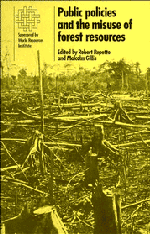Book contents
- Frontmatter
- Contents
- Contributors
- Foreword
- Acknowledgments
- 1 Overview
- 2 Indonesia: public policies, resource management, and the tropical forest
- 3 Malaysia: public policies and the tropical forest
- 4 Incentive policies and forest use in the Philippines
- 5 Price and policy: the keys to revamping China's forestry resources
- 6 Public policy and deforestation in the Brazilian Amazon
- 7 West Africa: resource management policies and the tropical forest
- 8 Subsidized timber sales from national forest lands in the United States
- 9 Conclusion: findings and policy implications
- Index of Topics
3 - Malaysia: public policies and the tropical forest
Published online by Cambridge University Press: 06 July 2010
- Frontmatter
- Contents
- Contributors
- Foreword
- Acknowledgments
- 1 Overview
- 2 Indonesia: public policies, resource management, and the tropical forest
- 3 Malaysia: public policies and the tropical forest
- 4 Incentive policies and forest use in the Philippines
- 5 Price and policy: the keys to revamping China's forestry resources
- 6 Public policy and deforestation in the Brazilian Amazon
- 7 West Africa: resource management policies and the tropical forest
- 8 Subsidized timber sales from national forest lands in the United States
- 9 Conclusion: findings and policy implications
- Index of Topics
Summary
There can be no meaningful discussion of the implications of “Malaysian” policies impinging upon Malaysia's natural forest estate. Subnational governments in Malaysia possess great autonomy; in forestry policy autonomy has been defined with particular clarity. We may, however, speak of Sabah policies, Sarawak policies, and to a very limited extent, Peninsular Malaysian policies affecting the forest sector.
Accordingly, this chapter is divided into five distinct sections. The first sketches the salient features of forest endowments, forest utilization, and forest policies in Malaysia as a whole. The second section focuses upon forest exploitation and public policies in the state of Sabah, where timber harvest and deforestation rates have been the most rapid in recent years. The third section examines forest issues and forest policies in Sarawak state, and the fourth deals with these questions in the 12 states of Peninsular Malaysia. The final section focuses upon the implications of national-level non-forestry policies on deforestation in all three regions.
Malaysia: east and west
Malaysia is composed of three distinct and geographically separate regions: Peninsular Malaysia, containing 12 states, and the East Malaysian states of Sabah and Sarawak in the northern portion of the island of Borneo. Peninsular Malaysia, also known as West Malaysia, contains 40 percent of the nation's total land area (Table 3.1), but 81 percent of the population, 14.9 million people in 1983. Malaysia is a relatively wealthy country: 1985 GNP per capita, at US $2,000, was nearly four times that of neighboring Indonesia (World Bank 1987: 202).
Most of the factors responsible for deforestation in Indonesia since 1950 have also been operative in Malaysia: poverty, institutions, and public policies.
- Type
- Chapter
- Information
- Public Policies and the Misuse of Forest Resources , pp. 115 - 164Publisher: Cambridge University PressPrint publication year: 1988
- 9
- Cited by



